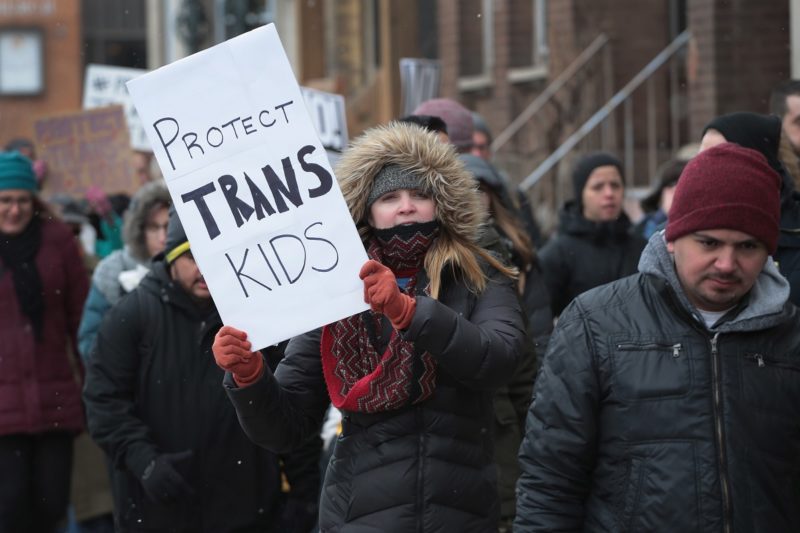The Department of Education’s Move to Abandon Trans Students Is a Setback, but It’s Not the End
It is important to remember that the actions of the DOE under President Donald Trump are not the law.

In yet another blow to the rights and protections of trans students, the U.S. Department of Education (DOE) has finally confirmed that it will no longer look into Title IX complaints filed by trans students when they are barred from school bathrooms or locker rooms that conform with their gender identity. While this is an enormous setback for trans rights, it is important to remember that the actions of President Donald Trump’s DOE are not the law.
Title IX of the Education Amendments of 1972 prohibits discrimination on the basis of sex in all federally funded education programs and activities. For several years under the Obama administration, students were able to use Title IX as a mechanism to bring complaints against school districts that forced them to use the wrong bathroom or other facilities, and Obama’s DOE assisted in investigating and addressing those complaints, which meant students had avenues for relief that didn’t necessarily involve individually suing the school. Under the Trump administration, however, the department almost immediately moved to withdraw the Obama-era guidance instructing schools that transgender students have a right to use the bathroom that is consistent with their gender identity.
The administration kept trans students in a terrible limbo for almost an entire year after that. In June, the DOE’s Office of Civil Rights (OCR) issued a confusing memo that stated that, although the department was no longer instructing schools to allow trans students to use the appropriate bathroom, OCR might still investigate these sorts of complaints if a school district failed to promptly respond to or resolve an issue of sex discrimination, or sexual or gender-based harassment, against trans students.
All this threw existing litigation over trans rights into chaos. The U.S. Supreme Court was set to hear the Gavin Grimm case, in which a transgender high school student sought to use the bathroom that conformed with his gender identity. When the Trump administration reversed course on Title IX protections, the Supreme Court ended up sending the case back down to the Fourth Circuit to be reconsidered pursuant to the new non-trans-friendly guidance. (Grimm has since graduated, but the case is ongoing.)
In January 2018, it came to light that the OCR was was outright refusing to investigate Title IX complaints from transgender students, essentially informing those complainants that they could pursue their cases individually in court instead. That remedy, of course, switches the burden entirely away from having OCR investigate and entirely onto the student and the student’s family, who then must find a way to fund long-term litigation against a school district.
Monday, the Department of Education finally fully explained its stance, going beyond rescinding the guidance to explicitly say that Title IX prohibits discrimination on the basis of sex but not gender identity. Its representatives went on to explicitly state that “in the case of bathrooms … long-standing regulations provide that separating facilities on the basis of sex is not a form of discrimination prohibited by Title IX.”
This view echoes that of the anti-LGBTQ legal advocacy group Alliance Defending Freedom (ADF). ADF frequently files anti-trans lawsuits revolving around the bigoted and outdated notion that “the term ‘sex’ refers to one’s biological/anatomical status as either male or female. Sex is fixed at conception, binary, objectively verifiable, and rooted in our human reproductive nature.” To have the OCR essentially adopt this view is devastating and a giant step backwards.
The only good thing to be said about OCR explicitly confirming that it will not even accept, much less investigate, transgender student bathroom complaints is that at least the matter is resolved. Trans students now know definitively that they cannot look to the Department of Education to protect them. They can pursue court cases, but litigation is expensive and school districts have the resources to fight these cases for years. Indeed, litigation can take so long that students like Grimm may graduate before they have their rights vindicated.
One of the most unfortunate things about the Trump administration’s stance here is that it may lead people to believe that Title IX does not protect trans students in this situation. That’s simply not the case. The National School Boards Association, which tracks transgender litigation in K-12 schools, has found that there are at least 15 open cases against school districts regarding the rights of transgender students and notes that school districts have settled trans student bathroom and locker room access cases quite recently.
As recently as December 2017, a federal district court in Illinois held that a transgender student had the right to use the locker room that conformed with her gender identity. That court noted the U.S. Court of Appeals for the Seventh Circuit (which includes Illinois) has “conclusively held [that] federal protections against sex discrimination are substantially broader than based only on genitalia or chromosome” and therefore Title IX protected the student.
At root, this refusal to properly apply Title IX is behavior that is endemic in the Trump administration: flouting the rule of law in order to bow to conservative views. There’s no solution except to keep fighting in the courts: pressing the issue case by case, circuit by circuit, and build a body of law that can protect trans students from their own government.

